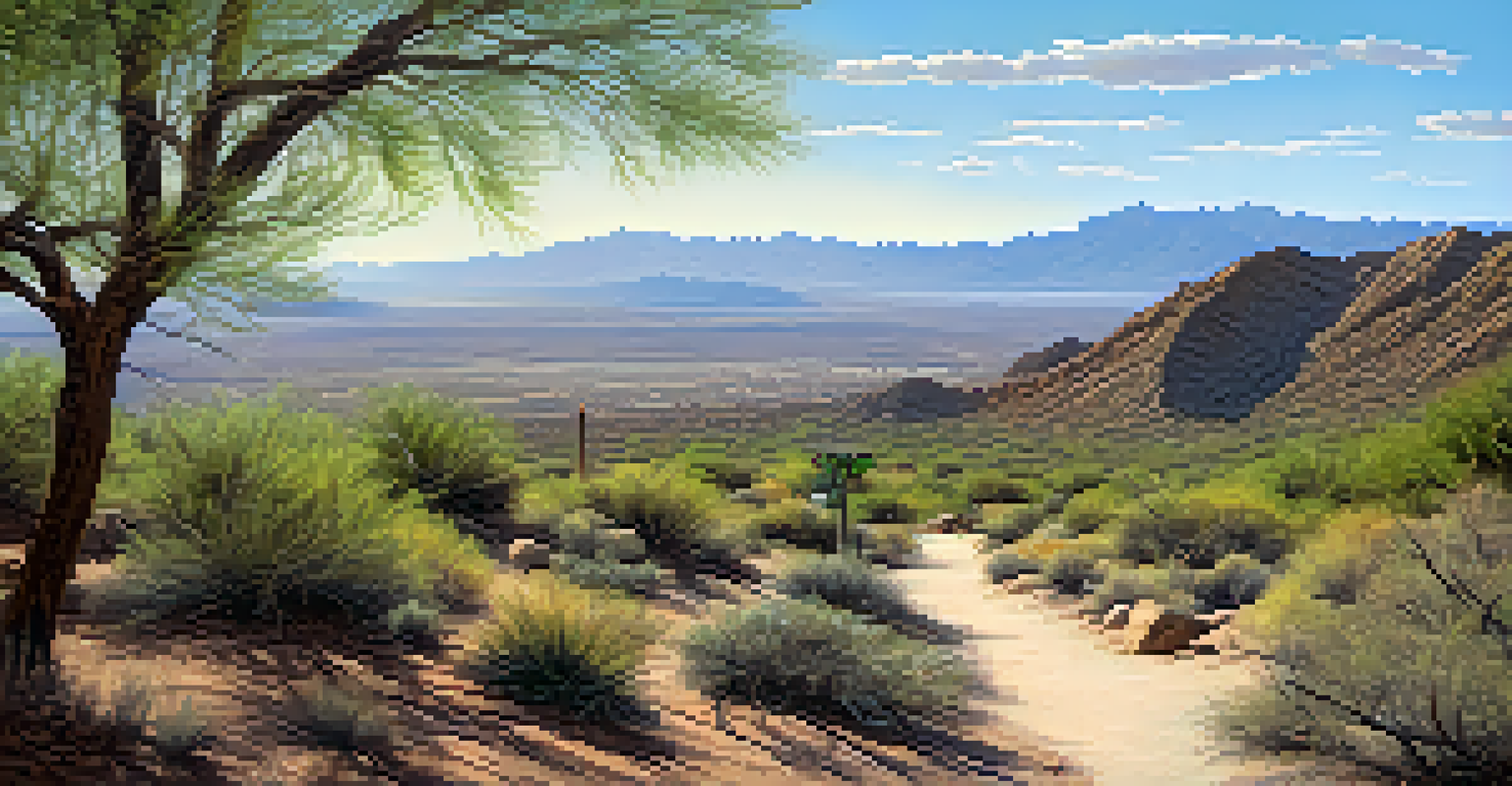The Role of Parks in Phoenix's Urban Environment

Parks as Urban Oases in Phoenix's Desert Environment
In the midst of Phoenix's sprawling urban development, parks serve as essential oases, offering much-needed green space. These parks provide a contrast to the desert landscape, creating a sanctuary for residents and wildlife alike. By incorporating trees, grass, and water features, they help mitigate the heat and enhance local biodiversity.
Parks are a vital part of a healthy community. They bring people together, provide a place for recreation and relaxation, and improve the quality of life for everyone.
For instance, the popular Encanto Park features a beautiful lake surrounded by lush greenery, making it a perfect spot for families to picnic or enjoy recreational activities. This contrast not only beautifies the area but also promotes better air quality, a significant benefit in a city known for its high temperatures.
Moreover, these green spaces play a crucial role in stormwater management, allowing for the absorption of rainwater and reducing runoff. In this way, parks not only beautify the urban landscape but also contribute to a healthier, more sustainable environment.
Enhancing Community Well-Being Through Green Spaces
Parks are more than just pretty landscapes; they significantly boost community well-being. They provide a gathering place for families, friends, and neighbors, fostering social connections that are vital for a thriving community. Activities like community gardening, outdoor yoga, and local events create a sense of belonging and encourage residents to engage with one another.

Take the example of Margaret T. Hance Park, which hosts various cultural events throughout the year. These gatherings not only entertain but also educate residents about local culture, promoting a deeper appreciation for the community's diversity.
Parks Enhance Community Well-Being
Parks foster social connections and promote physical activity, significantly boosting the overall well-being of the community.
Additionally, parks encourage physical activity, which is vital for maintaining a healthy lifestyle. With walking paths, sports fields, and playgrounds, they invite residents of all ages to get outside and be active, ultimately leading to improved physical and mental health.
Parks and Their Role in Urban Sustainability
As urban areas expand, sustainability becomes increasingly important, and parks play a critical role in this effort. They help to combat urban heat islands by providing shaded areas and cooler microclimates, which can lower surrounding temperatures significantly. This cooling effect is especially important in a city like Phoenix, where summer temperatures can soar above 100 degrees Fahrenheit.
The best way to predict the future is to create it, and parks are an essential part of creating a bright future for our communities.
Moreover, parks contribute to the overall resilience of urban ecosystems. They provide habitats for various species, promoting biodiversity within the city. By supporting local wildlife, parks help maintain ecological balance, which is crucial for the health of the environment.
In addition to their ecological benefits, parks can also enhance property values in nearby neighborhoods. A well-maintained park can make an area more desirable, driving up home prices and attracting new residents who seek the benefits of living close to green spaces.
Promoting Mental Health and Well-Being in Urban Settings
The importance of mental health in urban environments cannot be overstated, and parks offer a natural remedy. Simply spending time in a green space has been shown to reduce stress, anxiety, and depression. The calming effect of nature, combined with opportunities for recreation and relaxation, makes parks a vital resource for mental well-being.
For many residents, a walk in a local park can feel like a mini-vacation from the hustle and bustle of city life. Places like South Mountain Park provide trails and scenic views that allow people to disconnect from their daily stressors and reconnect with nature.
Parks Promote Urban Sustainability
By creating cooler microclimates and supporting biodiversity, parks play a critical role in making urban areas more sustainable.
Moreover, parks often host wellness programs, such as meditation classes or outdoor fitness sessions, further promoting mental health. This holistic approach to well-being enhances the overall quality of life for Phoenix residents, making parks invaluable community assets.
Educational Opportunities in Phoenix's Parks
Parks in Phoenix not only serve recreational purposes but also provide educational opportunities for residents of all ages. Many parks feature programs that teach about local wildlife, ecology, and environmental stewardship. These initiatives inspire a sense of responsibility towards nature and encourage conservation efforts.
For instance, the Phoenix Zoo, located near Papago Park, offers educational programs that emphasize the importance of wildlife preservation. By engaging children and adults alike, such programs foster a deeper connection to the environment and promote lifelong learning.
Additionally, parks often partner with local schools to provide field trips and hands-on learning experiences. This integration of education and nature helps cultivate a generation that values and protects their natural surroundings.
Parks as Spaces for Cultural Expression and Events
Cultural expression thrives in Phoenix's parks, which often serve as venues for festivals, art shows, and community gatherings. These events allow residents to celebrate their diverse backgrounds and share their traditions with one another. Parks become vibrant hubs of cultural exchange, enriching the community's social fabric.
For example, the annual Phoenix Festival of the Arts transforms parks into colorful showcases of local talent, featuring art installations, live music, and performances. Such events not only entertain but also support local artists and businesses, highlighting the unique cultural identity of the city.
Parks Provide Educational Opportunities
Many parks offer educational programs that inspire environmental stewardship and foster a deeper connection to nature among residents.
Moreover, parks provide a platform for advocacy and awareness campaigns. Community groups can organize events that draw attention to important social issues, making parks essential spaces for civic engagement and community empowerment.
Challenges Facing Parks in Phoenix's Urban Landscape
Despite their many benefits, parks in Phoenix face several challenges that can hinder their effectiveness. Limited funding and maintenance resources often lead to neglected facilities, which can discourage community use. Addressing these challenges is vital to ensuring parks remain accessible and welcoming for all residents.
Additionally, urban development pressures can threaten park spaces, as land may be repurposed for housing or commercial projects. This ongoing battle highlights the need for strong advocacy and policies that prioritize the preservation of green spaces within the city.

Community involvement is crucial in addressing these challenges. By advocating for park improvements and participating in local planning efforts, residents can help ensure that Phoenix's parks continue to thrive and serve the community effectively.